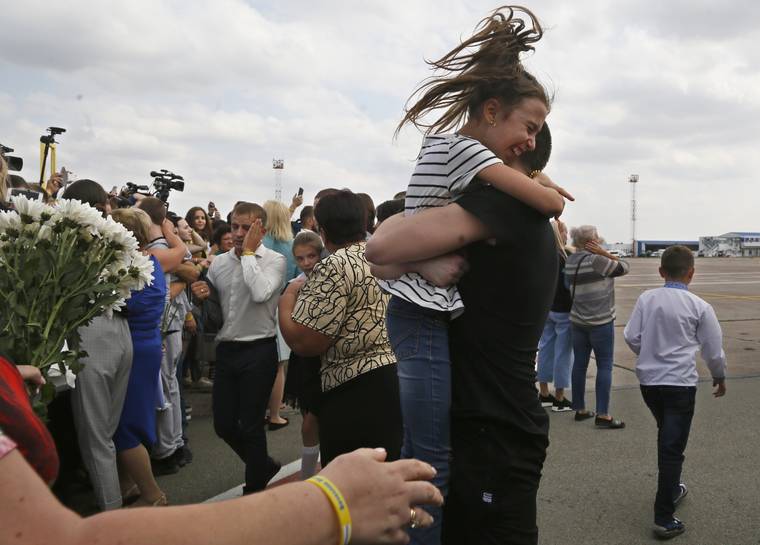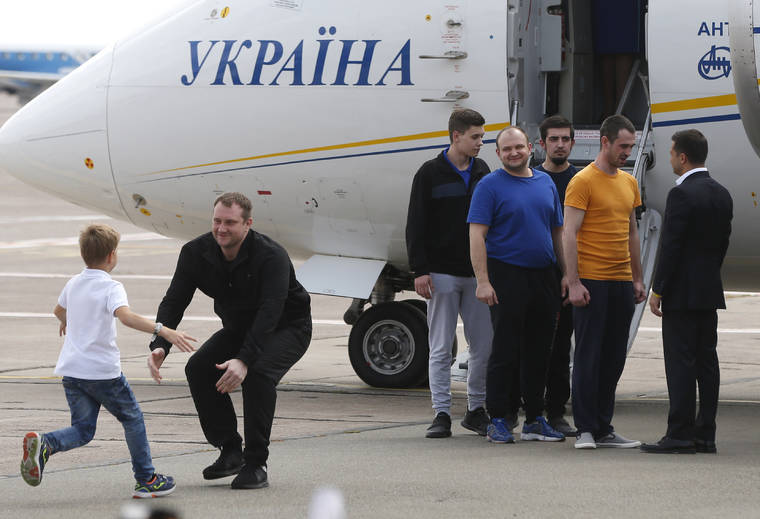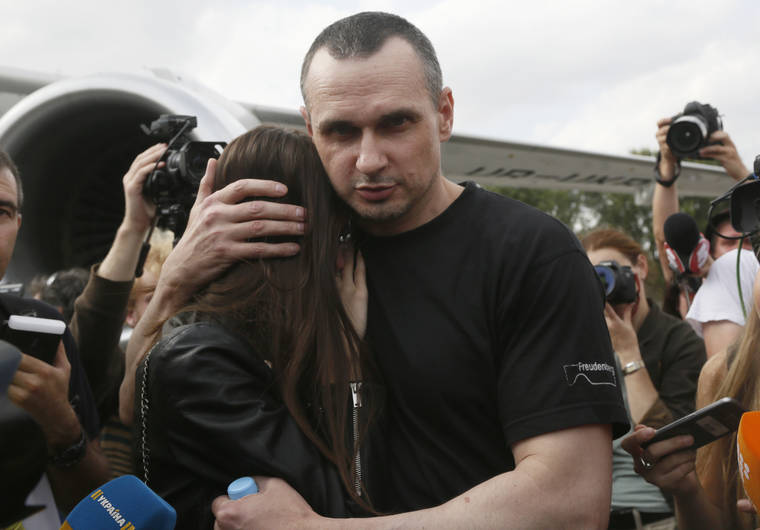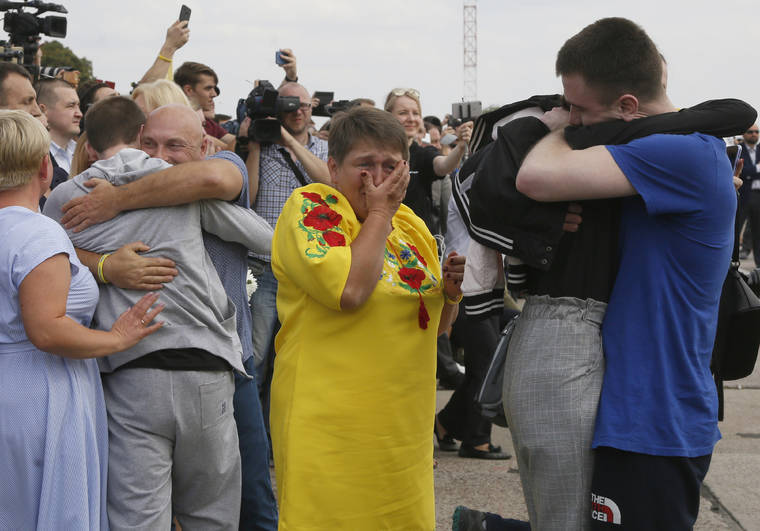Russia and Ukraine trade prisoners, each fly 35 to freedom


ASSOCIATED PRESS
Relatives of Ukrainian prisoners freed by Russia greet them upon their arrival at Boryspil airport, outside Kyiv, Ukraine. Planes carrying prisoners freed by Russia and Ukraine have landed in the countries’ capitals, in an exchange that could be a significant step toward improving relations between Moscow and Kyiv. The planes, each reportedly carrying 35 prisoners, landed almost simultaneously at Vnukovo airport in Moscow and at Kyiv’s Boryspil airport.


ASSOCIATED PRESS
Ukrainian filmmaker Oleg Sentsov hugs his daughter upon his arrival at Boryspil airport, outside Kyiv, Ukraine. Planes carrying prisoners freed by Russia and Ukraine have landed in the countries’ capitals, in an exchange that could be a significant step toward improving relations between Moscow and Kyiv. The planes, each reportedly carrying 35 prisoners, landed almost simultaneously at Vnukovo airport in Moscow and at Kyiv’s Boryspil airport.

ASSOCIATED PRESS
Relatives of Ukrainian prisoners freed by Russia greet them upon their arrival at Boryspil airport, outside Kyiv, Ukraine. Planes carrying prisoners freed by Russia and Ukraine have landed in the countries’ capitals, in an exchange that could be a significant step toward improving relations between Moscow and Kyiv. The planes, each reportedly carrying 35 prisoners, landed almost simultaneously at Vnukovo airport in Moscow and at Kyiv’s Boryspil airport.





MOSCOW >> Russia and Ukraine conducted a major prisoner exchange that freed 35 people detained in each country and flew them to the other, a deal that could help advance Russia-Ukraine relations and end five years of fighting in Ukraine’s east.
The trade involved some of the highest-profile prisoners caught up in a bitter standoff between Ukraine and Russia.
Among those Russia returned was Ukrainian film director Oleg Sentsov, whose conviction for preparing terrorist attacks was strongly denounced abroad, and 24 Ukrainian sailors taken with a ship the Russian navy seized last year.
The prisoners released by Ukraine included Volodymyr Tsemakh, who commanded a separatist rebel air defense unit in the area where a Malaysian airliner was shot down in 2014, killing all 298 people aboard.
Dozens of Ukrainian lawmakers urged Ukrainian President Volodymyr Zelenskiy against trading Tsemakh, who Dutch investigators probing the aircraft’s downing want to question.
Although critics saw the Ukraine president’s freeing of Tsemakh as an act of submissiveness to Russia, the exchange “allows Zelenskiy to fulfill one of his main pre-election promises,” Ukrainian analyst Vadim Karasev told The Associated Press.
Don't miss out on what's happening!
Stay in touch with breaking news, as it happens, conveniently in your email inbox. It's FREE!
Zelenskiy, who was elected in a landslide in April, has promised new initiatives to resolve the war in eastern Ukraine.
The exchange of prisoners also raises hope in Russia for the reduction of European sanctions imposed because of its role in the conflict, Karasev said.
Zelenskiy greeted the freed prisoners as they stepped down from the airplane that had brought them from Moscow to Kyiv’s Boryspil airport. Relatives waiting on the tarmac surged forward to hug their loved ones.
Most of the ex-detainees appeared to be in good physical condition, although one struggled down the steps on crutches and another was held by the arms as he slowly navigated the steps.
“Hell has ended; everyone is alive and that is the main thing,” Vyacheslav Zinchenko, 30, one of the released sailors, said.
He and 23 others were seized after Russian ships fired on two Ukrainian vessels on Nov. 25 in the Kerch Strait, located between the Black Sea and the Sea of Azov next to Russia-annexed Crimea.
“Russia was not able to break me even though they tried hard to do this,” said Nikolai Karpyuk, who was imprisoned in 2016 after he was convicted of killing Russians in Chechnya in the 1990s.
At Moscow’s Vnukovo airport, the released prisoners remained on the plane for about 15 minutes for unknown reasons. When they came off, many toting baggage, a bus drove them to a medical facility for examination.
Another Ukrainian on the plane from Moscow was Kirill Vyshinsky, head of Russian state news agency RIA-Novosti’s Ukraine branch. He had been jailed since 2018 on treason charges.
Vyshinksy thanked Harlem Desir, the media freedom representative for the Organization for Security and Cooperation In Europe, for calling for his release.
Russia said it would release a full list of its citizens freed by Ukraine later Saturday.
The exchange comes amid renewed hope that a solution can be found to the fighting in Ukraine’s east that has killed 13,000 people since 2014. A congratulatory tweet from U.S. President Donald Trump called the trade “good news.”
“Russia and Ukraine just swapped large numbers of prisoners. Very good news, perhaps a first giant step to peace,” Trump’s tweet said. “Congratulations to both countries!”
However, reaching a peace agreement faces many obstacles, such as determining the final territorial status of rebel-held areas. Russia insists it has not supported the rebels and the fighting is Ukraine’s internal affair.
A Russian Foreign Ministry statement welcoming the exchange touched on those difficulties, calling the war an “intra-Ukraine conflict.”
“Obviously, the habit of blaming Russia for all the troubles of Ukraine should remain in the past,” the ministry statement said.
The prospect of progress nevertheless appeared to rise last month with the announcement of a planned summit of the leaders of Russia, Ukraine, France and Germany – the four countries with representatives in the long-dormant “Normandy format,” a group seeking to end the conflict.
“We have made the first step. It was very complicated. Further, we will come closer to the return of our (war) prisoners,” Zelenskiy said of the prisoner exchange.
In July, a tentative agreement for the release of 69 Ukrainian prisoners and 208 held in Ukraine was reached by the Trilateral Contact Group of Russia, Ukraine and the Organization for Security and Cooperation in Europe; negotiations on fulfilling it continue.
Konstantin Kosachev, head of the foreign relations committee in the Russian parliament’s upper house, said the exchange represented a move “in the direction of crossing from confrontation to dialogue, and one can only thank those thanks to whose strength this became possible.”



